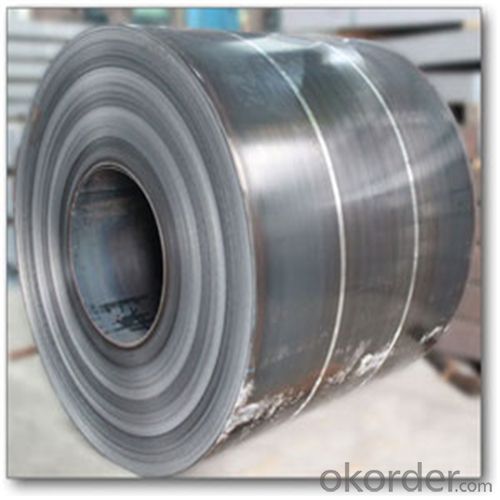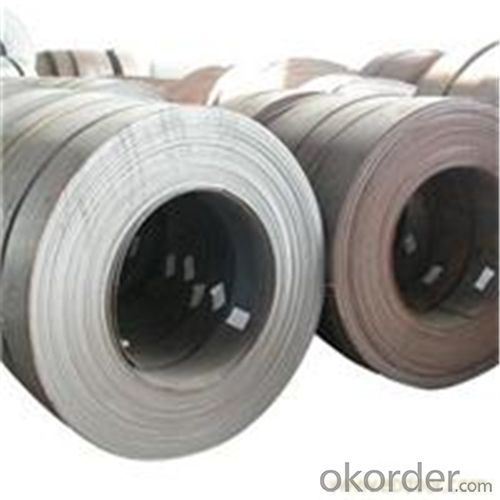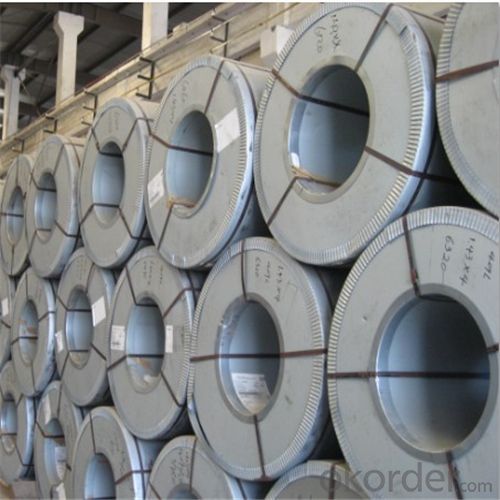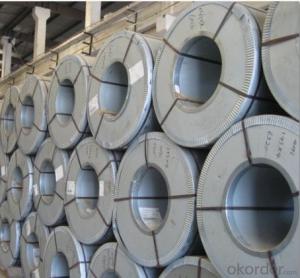Hot Rolled Steel Coil Used for Industry with So Much Attractive Price
- Loading Port:
- Tianjin
- Payment Terms:
- TT OR LC
- Min Order Qty:
- 25 m.t.
- Supply Capability:
- 10000 m.t./month
OKorder Service Pledge
OKorder Financial Service
You Might Also Like
Hot Rolled Steel Coil Used for Industry
1.Structure of Hot Rolled Steel Coil Description
It can be in the form of plates, sheet and coils. Our Hot-Rolled Steel Sheets and Coils are applied to a wide range of uses such as automobile, electrical appliance, machinery manufacturing, container manufacturing, shipbuilding, bridge, and receive high acclaim from our customers for its excellent quality.
2.Main Features of the Hot Rolled Steel Coil
•High Purity
•Easy control and operation
•High strength
•Fast melting
•Competitive price
•Best Service
3. Hot Rolled Steel Coil Images



4. Hot Rolled Steel Coil Specification
HOT ROLLED STEEL COIL | |
Thicknenss | 1.5mm-25mm |
Width | 600mm-2000mm |
Sheets length | ---- |
Coil inner diameter | 762mm |
Surface treatement | ---- |
Coil weight | ---- |
5.FAQ of Hot Rolled Steel Coil
We have organized several common questions for our clients,may help you sincerely:
1.How about your company?
A world class manufacturer & supplier of castings forging in carbon steel and alloy steel,is one of the large-scale professional investment casting production bases in China,consisting of both casting foundry forging and machining factory. Annually more than 8000 tons Precision casting and forging parts are exported to markets in Europe,America and Japan. OEM casting and forging service available according to customer’s requirements.
2.How long can we receive the product after purchase?
In the purchase of product within three working days, We will arrange the factory delivery as soon as possible. The pecific time of receiving is related to the state and position of customers.Commonly 7 to 10 working days can be served.
We can supply customers' with different specifications of the highest quality and lowest price.
Sincerely welcome to contact us for the future details if any item interest you ,and we will make every effort to assure that your requirements will be satisfied ,and we hope to establish long-term business relations with you on the basis of the equality and mutual benefit.
We are waiting for your email.
- Q:How do steel coils contribute to earthquake resistance in structures?
- Steel coils contribute to earthquake resistance in structures by providing strength and flexibility. When used as reinforcement in concrete structures, steel coils help to distribute and dissipate the energy generated during an earthquake. This helps to prevent the excessive deformation or collapse of the structure, enhancing its overall seismic performance. Steel coils also improve the ductility of the structure, allowing it to withstand the dynamic forces and vibrations caused by seismic activity.
- Q:What are the major challenges faced by steel coil manufacturers?
- The major challenges faced by steel coil manufacturers can be categorized into several key areas. 1. Raw Material Costs: One of the primary challenges is the fluctuating prices of raw materials, such as iron ore and coal, which are essential for steel production. Manufacturers have to constantly monitor and adjust their pricing strategies to mitigate the impact of these fluctuations and maintain profitability. 2. Global Competition: Steel coil manufacturers face intense competition from both domestic and international players. Globalization has led to an increase in the availability of steel coils from various regions, making it crucial for manufacturers to differentiate themselves through quality, pricing, and customer service to remain competitive. 3. Technological Advancements: The steel industry is constantly evolving and adopting new technologies. Manufacturers need to invest in modern equipment and machinery to improve efficiency, reduce costs, and meet stringent quality standards. Keeping up with technological advancements can be challenging, especially for smaller or less financially stable manufacturers. 4. Environmental Regulations: Steel production is a resource-intensive process that can have a significant impact on the environment. Governments worldwide are imposing stricter regulations on emissions, waste disposal, and energy consumption, which poses a challenge for steel coil manufacturers. Compliance with these regulations requires significant investments in pollution control technologies and sustainable practices. 5. Skilled Workforce: The steel industry requires a skilled workforce with expertise in various areas such as metallurgy, engineering, and operations. However, attracting and retaining skilled employees can be challenging, as the industry faces a shortage of qualified personnel. Manufacturers need to invest in training and development programs to ensure a competent workforce and maintain operational excellence. 6. Economic Volatility: Steel coil manufacturers are highly sensitive to economic fluctuations. During periods of economic downturns, demand for steel products decreases, leading to excess capacity and lower profit margins. On the other hand, during economic booms, manufacturers may face challenges in meeting increased demand and ensuring timely delivery. 7. Transportation and Logistics: Steel coils are bulky and heavy, making transportation and logistics a significant challenge for manufacturers. Optimizing supply chain management, coordinating with freight partners, and ensuring timely delivery of products to customers across various geographies can be complex and costly. In conclusion, steel coil manufacturers face several challenges, including raw material costs, global competition, technological advancements, environmental regulations, skilled workforce requirements, economic volatility, and transportation logistics. Overcoming these challenges requires proactive strategies, continuous improvement, and a focus on innovation to remain competitive in the industry.
- Q:How are steel coils priced in the market?
- Steel coils are priced in the market based on various factors such as the current demand and supply levels, raw material costs, production and transportation expenses, market competition, and overall market conditions. Additionally, quality, size, and specifications of the steel coils also play a role in determining their pricing.
- Q:I felt that my nylon strings don't sound as good as steel ones. Is it okay that I replace them with steel ones, even if my guitar is classical? Thanks.
- I advise you not to as it will damage your guitar :) they do sound way better but that's what an acoustics for
- Q:As we all know Shaq killed the movie Steel by suckin so bad but does anyone know what happened to the comic book version.
- Addendum to the previous answer - although he doesn't have his own comic currently, John Henry Irons still appears in comics, most recently in several issues of 52.
- Q:I am getting a barn soon and I was debating between wood, and steel. I think steel would look nicer [painted of course] and I was wondering which is cheaper. Any extra info would be great. Thanks x
- steel would be cheeper and last longer
- Q:How do steel coils contribute to sustainability in manufacturing?
- Steel coils contribute to sustainability in manufacturing in several ways: 1. Recyclability: Steel is one of the most recycled materials in the world, with a recycling rate of over 90%. Steel coils are made from recycled steel and can be recycled again at the end of their life cycle. This reduces the need for extracting raw materials, conserves natural resources, and reduces energy consumption and greenhouse gas emissions associated with steel production. 2. Durability: Steel is known for its strength and durability. Steel coils are designed to withstand heavy loads, extreme temperatures, and harsh environmental conditions. This means that products made from steel coils, such as automotive parts, construction materials, and appliances, have a longer lifespan, reducing the need for frequent replacements and minimizing waste. 3. Energy efficiency: Steel coils are used in various manufacturing processes, such as stamping, forming, and welding. These processes require less energy when working with steel coils compared to other materials. Steel's high strength-to-weight ratio allows for the production of lightweight yet strong components, reducing energy consumption during transportation and improving fuel efficiency in vehicles. 4. Reduced emissions: Steel coils contribute to sustainability by helping manufacturers reduce their emissions. Steel is a low-carbon material, and its production emits fewer greenhouse gases compared to other materials like aluminum or plastics. By using steel coils, manufacturers can reduce their carbon footprint and contribute to climate change mitigation efforts. 5. Circular economy: Steel coils are a key component in the circular economy, which aims to minimize waste and maximize resource efficiency. Steel coils can be easily recycled and reused, ensuring that they remain in the production cycle for a longer time. This reduces the need for virgin materials and promotes a more sustainable and circular approach to manufacturing. In conclusion, steel coils contribute to sustainability in manufacturing by being recyclable, durable, energy-efficient, emission-reducing, and promoting a circular economy. By choosing steel as a material and utilizing steel coils, manufacturers can make significant strides towards reducing their environmental impact and fostering a more sustainable manufacturing industry.
- Q:What is steel made of? What are the elements other than iron?
- iron (Fe) and carbon (C). Carbon is in small proportion, from 0.1% to 1.7% or so. If you go over 1.7% carbon by weight you get cast iron, which is much less hard than steel.
- Q:Can steel coils be used in the production of construction machinery?
- Yes, steel coils can be used in the production of construction machinery. Steel coils are often used as raw materials for manufacturing various components of construction machinery, such as frames, supports, and structural parts. The strength, durability, and resistance to corrosion of steel make it an ideal material for construction machinery, ensuring the longevity and reliability of the equipment.
- Q:How are steel coils used in the production of conveyor systems?
- Steel coils are used in the production of conveyor systems as they are formed into sturdy, durable belts that are capable of withstanding heavy loads and continuous operation. The coils are typically flattened and shaped into long lengths before being assembled into conveyor belts, ensuring optimal strength and flexibility for efficient material handling.
1. Manufacturer Overview |
|
|---|---|
| Location | |
| Year Established | |
| Annual Output Value | |
| Main Markets | |
| Company Certifications | |
2. Manufacturer Certificates |
|
|---|---|
| a) Certification Name | |
| Range | |
| Reference | |
| Validity Period | |
3. Manufacturer Capability |
|
|---|---|
| a)Trade Capacity | |
| Nearest Port | |
| Export Percentage | |
| No.of Employees in Trade Department | |
| Language Spoken: | |
| b)Factory Information | |
| Factory Size: | |
| No. of Production Lines | |
| Contract Manufacturing | |
| Product Price Range | |
Send your message to us
Hot Rolled Steel Coil Used for Industry with So Much Attractive Price
- Loading Port:
- Tianjin
- Payment Terms:
- TT OR LC
- Min Order Qty:
- 25 m.t.
- Supply Capability:
- 10000 m.t./month
OKorder Service Pledge
OKorder Financial Service
Similar products
New products
Hot products
Hot Searches
Related keywords





























